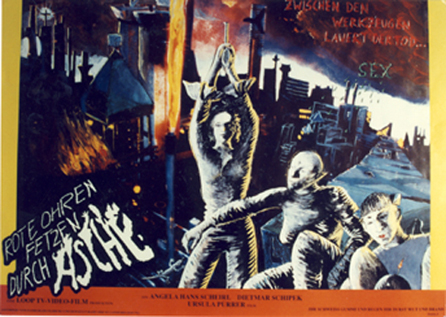
Rote Ohren fetzen durch Asche
INTERVIEW WITH THE DIRECTORS OF FLAMING EARS
INTERVIEWER: FLAMING EARS is a manual, a plan. At the same time it is a film that doesn't exhibit any false modesty and, in the moments of sexual subjection and violence, shows lust as explicitly as a classical Western. I would like to have more of this, it should even be wilder! URSULA: Me too! Everything's burning and the desire for the cinema can hardly be extinguished any more.
INTERVIEWER: In a time when the public deconstruction of experimental art and social forms beyond the average norm becomes more and more obvious, this nightsong of the flames ... is wonderful ... liberating, primitive.
ANGELA: Yes, primitive, for example the way they lead their lives. They have to see that they find enough to eat, and they have to protect themselves; they are at the mercy of nature's forces, and there are wars going on. But neverless, or maybe because of it, all this is possible: Passion, instant greed, an irresistable physicality. Power mechanics pull the strings. lt's also about challenging the notions of female and male. The film, like ourselves, is like a will-o'- the-whisp frequenting the space between.
DIETMAR: I would say the film shows exactly the world we live in. After all, a decent way to work with film and photography is to follow radical states of mind and ardent instincts and to totally succumb to your own impulses. That is cinema!
INTERVIEWER: And pornography?
ANGELA: I think a titillating image has to be a good image.
INTERVIEWER: In FLAMING EARS so many strong women appear, that the consequence can only be uncompromising murder.
ANGELA: They are female lone warriors, and they try to live their lives as intensely as possible and thus collide with each other somehow. lt's a matter of life and death. And love.
URSULA: Sheroes, fighters! Surrealistic figures, sex, violence - perpetrators in general. Always women, and they concentrate on themselves and on their greed. These people are only defined by themselves and not by their relations to others. They claim their spaces and, like in the comix, are characterized by their own iconography.
ANGELA: A fresh wind is blowing out of horror films and comix: juicy greens and violet, morbid, ironic, exaggerated, absurd, phantastic, manic, mannered. There, frontiers are challenged. Fast! "Rote Ohren fetzen durch Asche."
INTERVIEWER: As women have a different starting point, the images will automaticly be different.
URSULA: I am a woman. I make films. I know how to work with a ridiculous budget: you can call me a master of improvisation. I'm lesbian and I have a preference for experiments, I am a strategist, a utopist. I am Volley. As simple as that. And Volley loves precision, ease, aggression, devotion and wit. I live in a special world, and I walk through the so-called world heavily armed.
ANGELA: Volley, the fighting diva, wrestling for the survival of her obsessions with hellish hot means! But contrary to the psychological cinema, where actors tell stories, we depict inner states with cinematic means.
INTERVIEWER: Yes, FLAMING EARS has an ecstatic quality, Im completely dazed by the colors.
DIETMAR: With pronounced fetishistic inclinations and a heart loaded with desire, I'm well taken care of in the cinema. There I find everything that is valuable to me, and I can concentrate on what is relevant: love, violence, sex, light and movement, language, artificiality and music. Film is risk and danger. I like to expose myself to danger. The viewer, by the way, as well. Because only under exceptional conditions can you produce unconditional films. Only when utter dedication can be felt, will the film have transformed into reality, and leaving the cinema will become a lasting discovery: "What is actually happening to oneself?"
